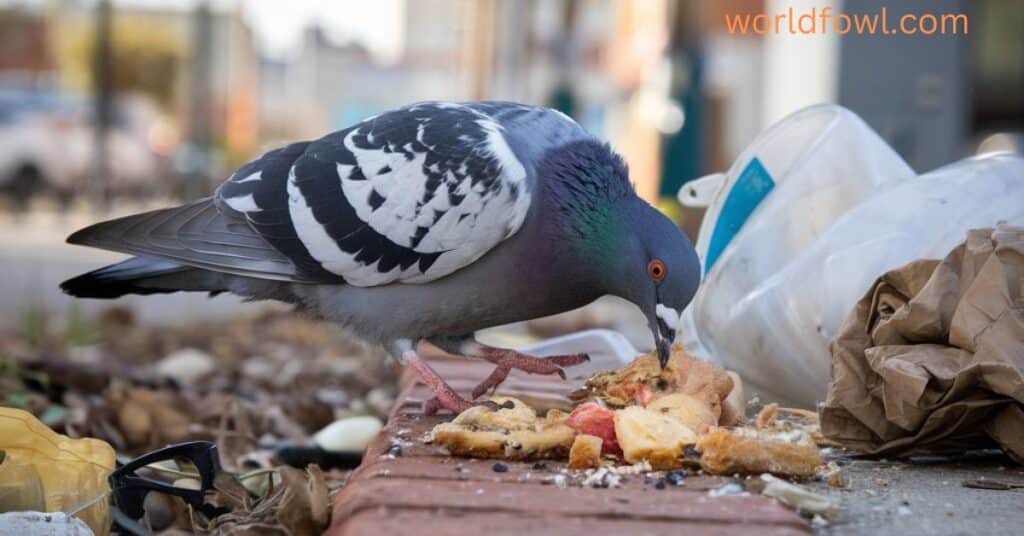Pigeons, those ubiquitous birds that strut through our cities and parks, have long been a subject of fascination and, sometimes, frustration. But have you ever stopped to wonder, “What do pigeons eat?” The answer might surprise you. From seeds to insects, and even some unexpected urban treats, the pigeon diet is as diverse as it is fascinating. Let’s dive into the world of pigeon nutrition and uncover the secrets of what keeps these feathered urbanites thriving.
The Natural Diet of Wild Pigeons
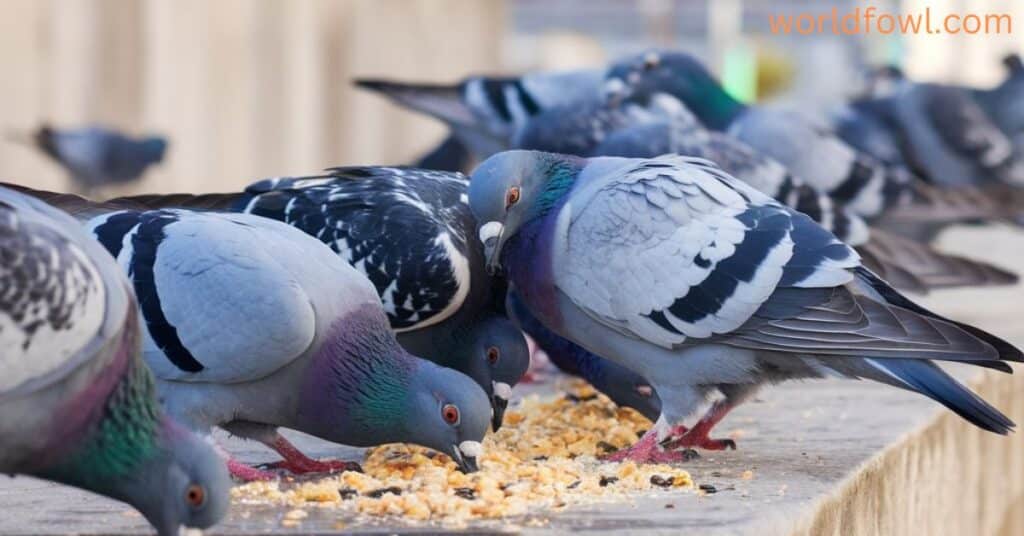
Before we delve into the eating habits of our city-dwelling feathered friends, let’s take a step back and look at what wild pigeons consume in their natural habitats.
Seeds: The Staple Food
In the wild, seeds form the backbone of a pigeon’s diet. These birds have evolved to be excellent seed eaters, with strong beaks perfect for cracking open tough seed coats. Pigeons eat a wide variety of seeds, including:
- Sunflower seeds
- Millet
- Safflower seeds
- Corn kernels
- Wheat
- Barley
Wild pigeons eat these seeds from various plants, foraging on the ground or plucking them directly from plants. Their ability to digest seeds efficiently is one reason why pigeons have adapted so well to urban environments, where scattered birdseed is often abundant.
Fruits and Berries: Nature’s Candy for Pigeons
While seeds make up the bulk of their diet, pigeons eat fruits and berries with gusto when available. These provide essential vitamins and variety to their diet. Some fruits that pigeons enjoy include:
- Berries (strawberries, blueberries, raspberries)
- Grapes
- Apple pieces (without seeds)
- Melon
It’s important to note that while pigeons eat fruits, they should be given in moderation, especially to city pigeons who might not be accustomed to a high-fruit diet.
you may also like : Small Blue Bird – 8 Blue Colored Birds In North America
Green Vegetation: Leafy Treats
Pigeons don’t just stop at seeds and fruits. They also enjoy a variety of green vegetation. In the wild, pigeons eat leaves, shoots, and even flowers. This greenery provides essential nutrients and fiber to their diet. Some common vegetation that pigeons eat includes:
- Lettuce
- Spinach
- Kale
- Grass shoots
Insects and Small Invertebrates: Protein Boost
While not a major part of their diet, pigeons eat insects and small invertebrates when the opportunity arises. This is particularly true for growing pigeons who need extra protein. Some of the small creatures that pigeons eat include:
- Worms
- Snails
- Insects
It’s worth noting that while pigeons eat some insects, they don’t actively hunt for them like some other bird species do.
Urban Pigeon Dining: Adapting to City Life
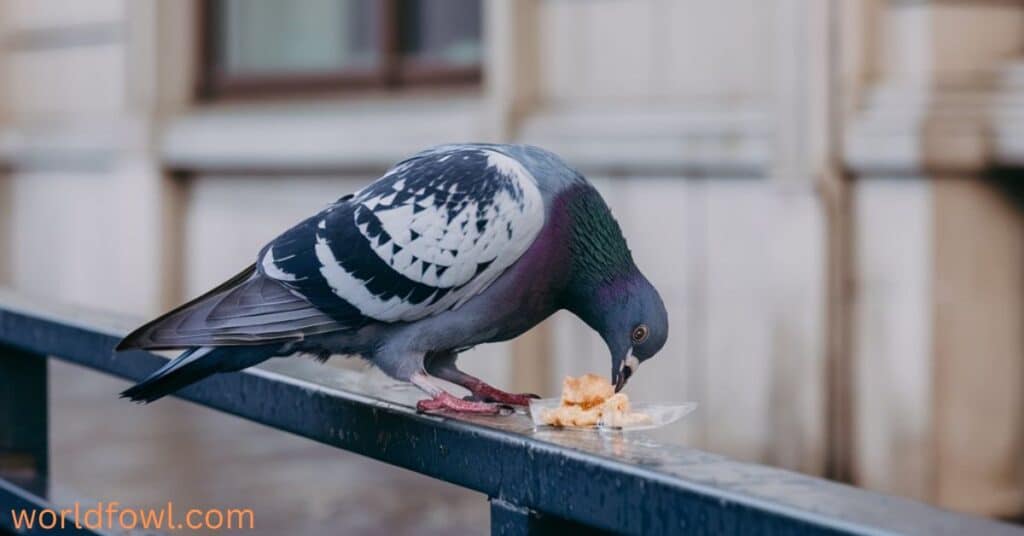
Now that we’ve covered what wild pigeons eat, let’s look at how their city-dwelling cousins have adapted their diets to urban life.
Human Food Scraps: The Good, the Bad, and the Ugly
One of the reasons pigeons thrive in urban environments is their ability to adapt their diet to what’s available. Unfortunately, this often means that city pigeons end up eating a lot of human food scraps. While pigeons eat these scraps out of necessity, it’s not always the healthiest option for them.
| Food Type | Good or Bad for Pigeons | Why? |
| Bread | Bad (in large quantities) | Low in nutrients, can cause malnutrition |
| Popcorn | Okay (in moderation) | Provides some nutrients, but not a complete diet |
| French fries | Bad | High in fat and salt, can lead to health problems |
| Pizza crusts | Bad | High in salt and processed ingredients |
As you can see, while pigeons eat these foods, they’re far from ideal for their health. It’s always better to feed pigeons foods closer to their natural diet if you choose to feed them at all.
Bird Feeders: A Pigeon’s Paradise
Bird feeders can be a great source of food for urban pigeons. Many people set up feeders intending to attract smaller songbirds, but pigeons are often happy to take advantage of this easy food source. Some of the foods commonly found in bird feeders that pigeons eat include:
- Sunflower seeds
- Millet
- Cracked corn
- Nyjer seeds
While these foods are generally better for pigeons than human food scraps, it’s important to remember that overfeeding can lead to overpopulation and other urban wildlife management issues.
Foraging in Parks and Sidewalks
Urban pigeons eat whatever they can find while foraging in parks and on sidewalks. This can include:
- Dropped food scraps
- Seeds from grasses and weeds
- Small insects or worms in the soil
This foraging behavior is a holdover from their wild ancestors and demonstrates the adaptability that has made pigeons so successful in urban environments.
What Do Baby Pigeons (Squabs) Eat?
Now that we’ve covered adult pigeon diets, you might be wondering, “What do baby pigeons eat?” The answer is quite fascinating!
you may also like : Finches in Ohio – 9 Ohio Finches (With Photos)
Crop Milk: Nature’s Perfect Baby Food
For the first few days of their lives, baby pigeons subsist entirely on a substance called “crop milk” or “pigeon milk“. Despite its name, this isn’t milk in the mammalian sense. Instead, it’s a protein-rich, fatty substance produced in the crops of both male and female parent pigeons.
Here are some fascinating facts about crop milk:
- It’s produced by sloughing off fat-filled cells from the lining of the crop.
- It contains more protein and fat than mammalian milk.
- Both male and female pigeons produce it.
- Production is stimulated by the hormone prolactin, just like in mammals.
This unique adaptation allows pigeons to raise their young even when other food sources are scarce, contributing to their success as a species.
Transition to Solid Foods
As the squabs grow, their parents gradually introduce solid foods into their diet. This transition usually begins when the squabs are about a week old. The parents will eat seeds and other foods, partially digest them in their crop, and then regurgitate this mixture for their young.
By the time they’re ready to leave the nest (usually around 4-6 weeks old), young pigeons are eating the same diet as their parents.
Pigeon Diet Myths Debunked
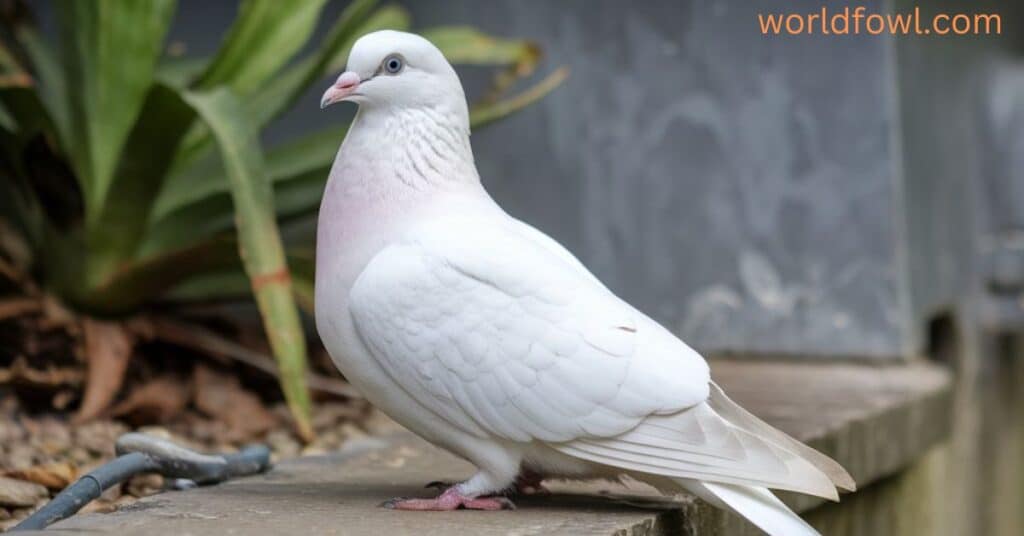
There are many myths and misconceptions about what pigeons eat. Let’s clear up some of the most common ones.
Can Pigeons Eat Rice?
You might have heard that you shouldn’t throw rice at weddings because birds (including pigeons) will eat it, it will expand in their stomachs, and cause them to explode. This is completely false!
Pigeons eat rice safely, both cooked and uncooked. In fact, rice can be a nutritious part of a pigeon’s diet. The myth likely started as a way to discourage people from throwing rice at weddings due to the slip hazard it creates.
Bread: A Pigeon’s Friend or Foe?
While pigeons eat bread readily, it’s not the best food for them. Bread is low in nutrients and can lead to malnutrition if it makes up too much of a pigeon’s diet. It’s okay as an occasional treat, but shouldn’t be a staple food.
The Truth About Pigeons and Chocolate
Chocolate is toxic to many animals, and pigeons are no exception. Pigeons eat a wide variety of foods, but chocolate should never be one of them. The theobromine in chocolate can cause serious health issues in birds, including pigeons.
Unique Food Preferences and Behaviors
Pigeons have some interesting and sometimes surprising food preferences and behaviors. Let’s explore a few of these.
Do Pigeons Eat Bees?
While pigeons eat some insects, they generally don’t eat bees. Bees are too small and fast-moving for pigeons to catch easily, and the risk of being stung likely outweighs any nutritional benefit.
Mealworms: A Protein-Packed Snack
Pigeons eat mealworms and find them to be a tasty, protein-rich treat. In the wild, pigeons might eat mealworms they come across while foraging. In captivity or in bird-feeding situations, mealworms can be a healthy addition to a pigeon’s diet.
Meat in a Pigeon’s Diet: Fact or Fantasy?
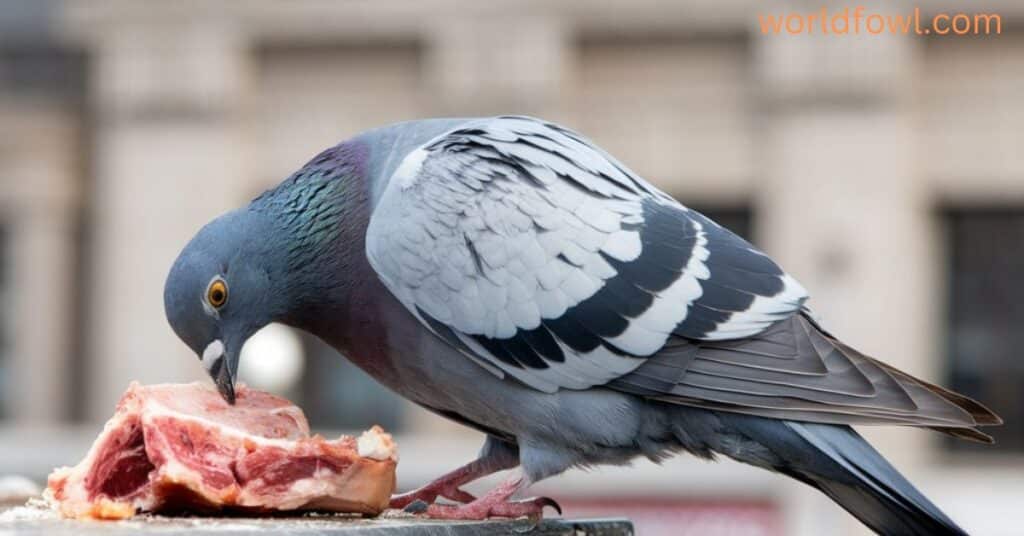
While pigeons eat primarily plant-based foods, they are opportunistic feeders and may occasionally consume small amounts of meat if it’s available. However, meat is not a natural or necessary part of a pigeon’s diet.
you may also like : How Long Do Quail Live? The Vulnerable Lives Of Quail
Healthy Treats for Pigeons
If you’re interested in feeding pigeons (where it’s legal and doesn’t cause nuisance), here are some healthy options:
Sunflower Seeds: A Pigeon Favorite
Pigeons eat sunflower seeds with great enthusiasm. These seeds are high in fat and protein, making them an excellent energy source for pigeons.
Oats: Nutritious and Delicious
Oats are another food that pigeons eat happily. They’re nutritious and easy for pigeons to digest. Rolled oats or steel-cut oats are better choices than instant oats, which often contain added sugars and flavorings.
Almonds: To Eat or Not to Eat?
While pigeons eat many types of nuts, almonds should be given sparingly and only if unsalted. The high fat content can be hard for pigeons to digest in large quantities.
Blueberries and Other Fruits: Nature’s Multivitamins
Fruits like blueberries can be a healthy treat for pigeons. They provide essential vitamins and add variety to a pigeon’s diet. Remember, though, that fruits should be given in moderation.
The Impact of Diet on Pigeon Health and Behavior
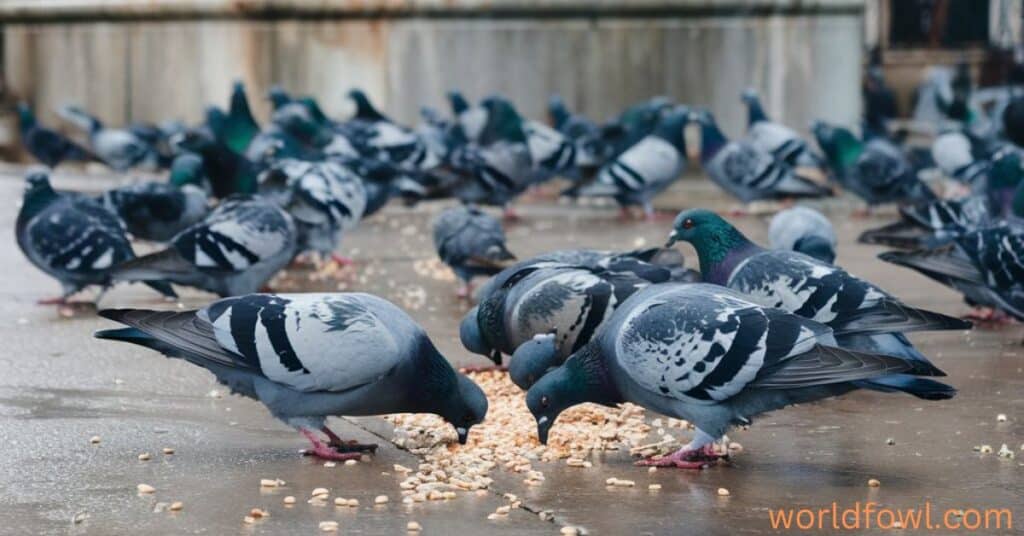
The diet of pigeons has a significant impact on their health, behavior, and even population dynamics. Let’s explore this further.
Nutritional Requirements for Optimal Health
Like all animals, pigeons require a balanced diet to maintain good health. Here’s a breakdown of their nutritional needs:
| Nutrient | Percentage of Diet | Sources |
| Protein | 12-14% | Seeds, legumes, insects |
| Fat | 2-4% | Seeds, nuts |
| Carbohydrates | 60-70% | Grains, seeds |
| Fiber | 4-6% | Greens, seed husks |
| Vitamins & Minerals | Varies | Fruits, vegetables, grit |
A diet that meets these requirements helps ensure that pigeons maintain good health, have the energy for daily activities, and can successfully reproduce.
How Diet Affects Breeding and Population Dynamics
The availability and quality of food directly impact pigeon breeding success and population sizes. When food is plentiful and nutritious, pigeons can breed more frequently and successfully raise more young. This is one reason why pigeon populations can explode in urban areas where food (often in the form of human food waste) is abundant.
Seasonal Changes in Food Availability and Preferences
While city pigeons often have access to food year-round, wild pigeons and even some urban pigeons may experience seasonal changes in their diet. For example:
- Spring: More fresh greens and insects available
- Summer: Abundance of seeds and fruits
- Fall: Increased foraging for seeds to build up fat reserves
- Winter: Reliance on stored foods and whatever can be foraged
These seasonal changes can affect pigeon behavior and even their nutritional status throughout the year.
you may also like : Types of Loons – The 5 Loons Types With Photos
Feeding Pigeons: The Human Dilemma
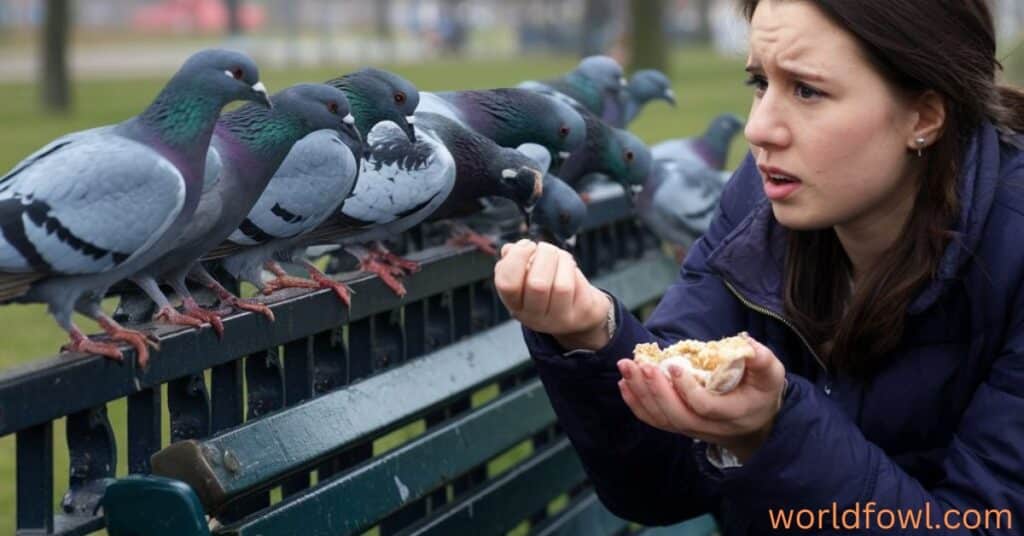
The question of whether humans should feed pigeons is a complex one, involving legal, ethical, and ecological considerations.
Legal and Ethical Considerations
In many cities, feeding pigeons is illegal due to concerns about overpopulation and the damage large flocks can cause to buildings. Even where it’s legal, there are ethical questions to consider:
- Are we helping or harming pigeons by feeding them?
- Does feeding pigeons disrupt natural behaviors and ecosystems?
- How does feeding pigeons impact other urban wildlife?
Impact on Urban Ecosystems
Feeding pigeons can have far-reaching effects on urban ecosystems:
- Overpopulation of pigeons can lead to increased competition for resources with other bird species.
- Large amounts of pigeon droppings can damage buildings and potentially spread disease.
- Excess food left out for pigeons can attract rats and other pests.
Responsible Ways to Interact with Urban Pigeons
If you want to interact with pigeons, consider these responsible approaches:
- Observe them from a distance without feeding.
- If feeding is legal in your area, offer small amounts of appropriate foods (like seeds) rather than bread or human food scraps.
- Support wildlife rehabilitation centers that care for injured or orphaned pigeons.
- Advocate for urban green spaces that provide natural foraging opportunities for pigeons and other wildlife.
Conclusion: Understanding and Appreciating Pigeon Diets
As we’ve explored, the question “What do pigeons eat?” has a complex and fascinating answer. From seeds and fruits in the wild to the varied diet of urban pigeons, these birds have shown remarkable adaptability in their feeding habits.
Key points to remember:
- Wild pigeons eat primarily seeds, supplemented with fruits, greens, and the occasional insect.
- Urban pigeons eat a wide variety of foods, including human food scraps, though this isn’t ideal for their health.
- Baby pigeons start life on a diet of crop milk before transitioning to solid foods.
- While pigeons eat many things, a balanced diet is crucial for their health and wellbeing.
Understanding pigeon diets not only satisfies our curiosity about these common birds but also helps us appreciate their place in our urban ecosystems. By making informed choices about whether and how to interact with pigeons, we can contribute to a healthier coexistence between humans and these adaptable birds.
Whether you’re a bird enthusiast, a city dweller curious about your feathered neighbors, or someone concerned about urban wildlife, knowing what pigeons eat is a step towards better understanding and appreciating these remarkable birds. So next time you see a pigeon pecking at the ground, you’ll have a new appreciation for the complex dietary needs and behaviors behind that simple act.

Henry James is a seasoned blogger and a passionate storyteller on “World Fowl.” With years of experience crafting engaging content, he brings a unique blend of expertise and creativity to his writing. Henry specializes in exploring diverse topics with depth and clarity, captivating readers worldwide.

